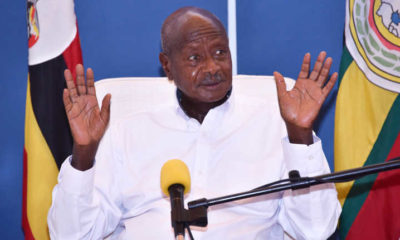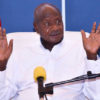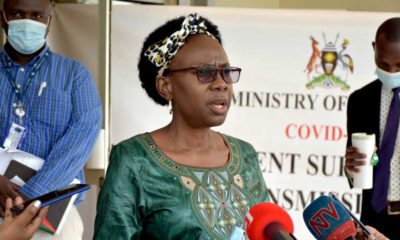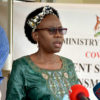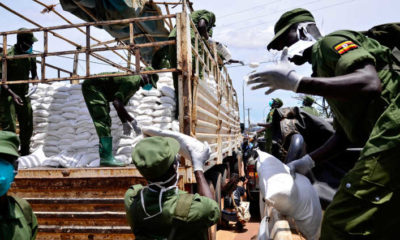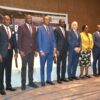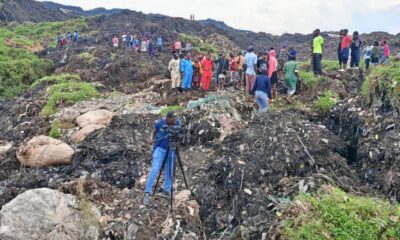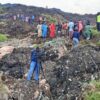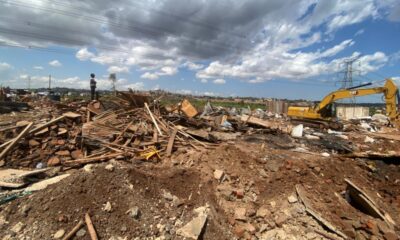Guest Writer
Addressing the flaws in the Ministry of Education’s framework for E-learning
By Jonathan Kivumbi, Educationist
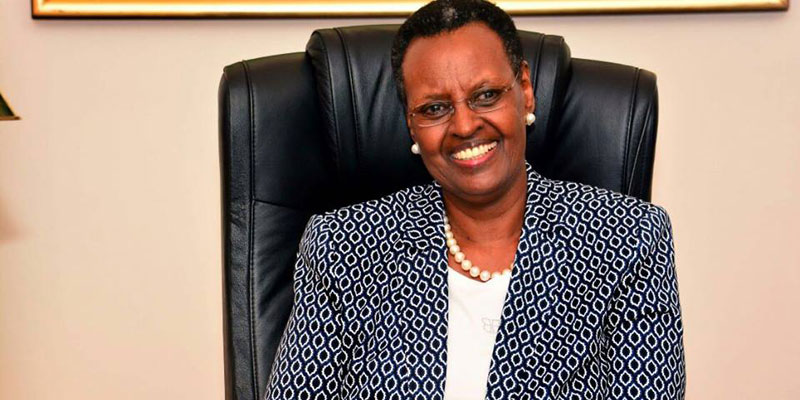
Education Minister Janet Museveni
When Corona Virus was detected in China, in December, 2019, nobody ever knew that it would hit the entire world, to this magnitude. It all started with China, but today the virus has been detected in 191 countries, worldwide. At least every continent has tested its wrath.
The 1918-20 Spanish Influenza, which is said to have claimed 50 million lives, was, indeed a deadly pandemic, but never did it ever push the entire world into lockdown, as is the case with Corona Virus. Uganda reported its first case of Corona Virus on March 21, 2020, just a day after all schools had called off their operations, following the President’s directive of closure of the same, on the dated cited.
Schools and education institutions have remained closed, since then. When the Minister of Education, Ms. Janet Museveni issued a tentative programme for re-opening of schools and higher institutions of learning, everyone, of whether they were direct beneficiaries, started seeing some light at the end of the tunnel.
Unfortunately, in his latest State of the Nation Address about the country’s progress on the virus, the President maintained the lockdown and also extended it by 21 days (April 14-May 5, 2020). Certainly, the extra 21 days have caused a lot panic, tension, and anxiety, specifically amongst students, teachers, parents and guardians, academics, at the different levels of instruction, as well as officials in the Ministry of Education.
To address the problem, the Ministry of Education, under the stewardship of Ms. Janet Museveni, the Education Minister, came up with a framework aimed at enhancing continued learning during this lockdown period, specifically for primary and secondary school students.
The model focuses at e-learning via radio, television, and any other related electronic gadget, as well as the distribution of relevant learning materials to those who do not have access to radio, television, or any other supporting instrument. Before taking my stand, let us first pose a few questions: Are we aware that this framework might prove to be a catalyst, in as far as spreading the virus is concerned?
Of course, I know many of you are interested in knowing how. By transferring school to radio and television, don’t you think students short of these gadgets are going to be forced out of their homes and join their friends who have the same during “class time?” By so doing, don’t you think either side, these children together with the rest of their family members will be at the risk of contracting the virus?
A few days ago, most parts of Kawanda and the neighbouring areas did not have power, people in Ssanga and Kavule, along Ssemuto road, have had issues with their transformer for over a month now; people around Entebbe-Kitara experience load shedding, almost on a daily basis, and I believe this problem cuts across the entire country. Surely, before flagging off radio and television lessons, did the Minister take account of this? Don’t you think children in the aforementioned areas are likely to dustbin the President’s message of “stay home, stay safe”, under the guise of seeking knowledge, aware of the fact that it is their chief duty? This way, crowds will emerge, and, as such, the life of every participant, including the people left at home, will be in danger. At a time where almost everyone is not working/earning, how many households can afford the luxury of TV subscription?
If many people could not afford buying a unit of Yaka on many occasions, before the lockdown, do we expect them to do so, now? Isn’t the Education Ministry taking people into temptation, since many, particularly those in business, might now be forced to prematurely end the lockdown so that they can find some income needed in sustaining their children’s education needs.
As a result, they will unlawfully open up their businesses and in the process, many will be arrested, tried, and detained. Surely, is this what the Ministry of Education, is wishing for the already stressed parent/guardian? Besides, don’t you think this could still be another source of the virus? The outcry for food across the country is overwhelming. People from border to border need food, not necessarily because they are poor, or vulnerable, per se, but because many can no longer fend for themselves and/or families.
According to the Education Ministry, do we expect hungry people to think about education? A number of companies, majorly, small and medium scale, have shut down, implying that employees of such companies have already lost their jobs. Even the large-scale enterprises that are still operational, must definitely be operating at excess capacity. This means, they, too will be compelled to lay-off some of their workers. The situation cannot be any different for the corporates.
Arguably, the probability of some individuals sent home by their employers ahead of this lockdown, staying there forever is 1. Surely, according to the Education Minister, Ms. Janet Museveni, do we vividly see a person who has already lost employment, or one at the verge of losing employment, thinking straight about education? Parents and guardians have been advised to study with their children, and thereafter, provoke them into discussion, to find out whether they were actually studying.
Surely, in a country where many people cannot take an oath in English language, how dare we give parents/guardians such a task? Besides, according to the Ministry, how many elite parents/guardians can ably assist their children with an English Language assignment in grammar, or composition writing? Don’t you think we are giving our parents too much work, at such a critical moment, where many, are pondering on how to get the next day’s meal, that is, if they were lucky to have something for the stomach, the previous day?
While coming up with this programme, which parent/guardian/student did the Ministry have, in particular? While children whose parents/guardians holding key positions in Uganda Revenue Authority (URA), Mulago Hospital, and the Uganda Police Force, among others, might go on with their e-learning lessons, uninterrupted, their counterparts whose parents/guardians are bar operators, salon operators, or taxi drivers are likely to miss out on the whole programme, since their parents/guardians no longer have a source of income.
Certainly, the Ministry of Education did not look at this. Thus, the assumption that whoever has a radio, television, or mobile phone is using it for the intended purpose, is false. The sample space is not far away from you, just check through your WhatsApp, and tell me if you won’t many of your friends who were last seen in March, 2020. If these are the people being told to monitor their children’s education on television and radio, then, I have no doubt, we are sending out an excellent message, to a wrong target audience. By so doing, communication breakdown ensues.
While some children have already started studying, those who do not have access to radio and television facilities, according to the Ministry, will have to wait on, till their self-learning materials are delivered to them by those charged with the responsibility. Two things to note here: First, what criteria are going to be used in identifying children who have access to e-learning facilities, and those that do not?
If I may ask the four ministers in the Education Ministry, including the Permanent Secretary, and all their subordinates, who of them can ably tell the number of people who do not have access to radio and television facilities, around their areas of residence (in a radius of 2km), to begin with? Second, what is the motive behind teaching the same student, using a different methodology? Does mean that Corona Virus has seen our primary and secondary school going children become post-graduate students, to the extent of subjecting them to “Plan A” and “Plan B” modules of teaching, as though they are going to write their dissertation reports?
The framework talks of the core subjects; according to the Ministry, which subjects are core, and, perhaps, which ones are non-core? Supposing Chemistry, at secondary school level is core, and Luganda is not, (mark the word, “supposing”), according to the Education Ministry, if a student registers for only eight subjects, and out of the eight, fails to sit for Luganda; what grade will this student be given?
I wish to be educated, if possible by the Minister of State for Higher Education, Dr. J. C. Muyingo, how one can conduct a Chemistry, Physics, Biology, Foods and Nutrition, Principles and Practices of Agriculture, Information Communications Techology, and Fine Art, especially the practical bit of it, via radio, television, or mobile phone? How can a lesson of Literature in English be effectively handled through the different electronic medium platforms? How can the oral French, Latin, and German lessons be conducted electronically?
The Ministry directed head teachers/teachers to have their ears on the ground so that they can be in position to notify the District/Municipal Inspectors of Schools (D/MISs), in their respective districts/municipalities about the progress of the lessons on television and radio; surely, according to the Education Ministry, how possible is this? After closing schools, did the Ministry expect head teachers and teachers, to remain at school?
Is the Ministry aware that a number of head teachers and teachers are busy in their gardens during this period, while others are already in the transport (boda boda) industry? Are these the people being told to monitor and supervise what is happening on television and radio? According to the framework, students are required to come up with a product (an innovation) made using local materials, from within their respective areas of residence; this could be a ball, rope, or mat, made out of banana fibres, or papyrus.
This product will be delivered to the teacher as soon as the term re-opens, and marks will be attached. Where does the Ministry expect children to obtain these materials from, yet they have each been confined to their homes? Don’t we think this is going to compel many to move, in the search of these materials, and in the end become victims of circumstances? So, the Ministry expects a teacher who has never made a ball, doll, or mat, using the aforementioned materials to be the one determining the student’s score?
With secretarial bureaus closed, how does the Ministry expect parents/guardians to print out the so many PDF/word documents that they are electronically receiving? Ever since he began addressing the nation about the issue of Corona Virus, the President has never mentioned teachers, educators, including University professors, among the essential group of people entitled to move; so, according to the Education Ministry, how must the selected teachers access the different radio and television stations where they are supposed to conduct their lessons from? If a plan for them to move has already been worked out, how was this arrived at?
If medical personnel have time and again appealed to the President to allow them move, and he has responded to their plea, as a routine, publicly, why is it taking a reverse direction when it comes to the Ministry of Education? For heaven’s sake, why did the Ministry of Education, bar Uganda Christian University, Mukono, from conducting their examinations online? The framework talks about students with special needs, as well; unfortunately, the details of how these are going to benefit from the whole arrangement is not shown anywhere. I would love to be educated on how the blind, deaf, and dumb students can be ably taught electronically.
I wish to call upon the National Union for Persons’ with Disabilities in Uganda (NUDiPU), together with the Members of Parliament for these people to get off their comfort zone, and raise a red flag against this whole arrangement. Why does Ms. Museveni get so involved with primary and secondary school education, but simply delegates to National Council for Higher Education (NCHE) on coming to institutions of higher learning? So, what academic programme does she want NCHE to come up with? Perhaps the Minister can tell us how students studying nursing and midwifery, who under whatever circumstances, must be attached to a hospital, can be helped to study from home.
How can students pursuing vocational and technical courses like carpentry, motor vehicle mechanics, industrial art and design, plumbing, brick laying, cosmetology, electronics, etc., be helped to study from home? “Go in for skills that are required in the job market,” said Dr. Muyingo, at the release of the 2019 Uganda Advanced Certificate of Education (UACE). Should we assume that while coming up with the ongoing e-learning programme, Dr. Muyingo was not in the midst, and that is why he ate up his words?
What programme does the Ministry have for school going children in those districts currently hit by floods? S.1 and S.5 students returned home with empty books, but the Ministry of Education is busy sending self-study materials, one after the other; could be I am living in a world of own; I need to be educated on how one can engage themselves in self-study, from scratch. Needless to emphasize the fact that besides being young, new to the system, the S.1 students are looking at a new curriculum, altogether. If expecting mothers and patients of all sorts have been compelled to either forgo their medication, or change their medication routine, surely, what is education?
Since when did education become a principal requirement, once compared with health? Who of the officials in the Education Ministry, has ever attended a burial ceremony for a person who died of missing exams? Don’t you think Justice Simon Byabakama, Chairperson Electoral Commission, also needs to get off his and embark on his official duties ahead of 2021, general elections? Be reminded that unless the Constitution is amended, as a country we must hold elections every after five years, whatsoever.
I am yet to read the 1983, UNEB Act, to find out whether sitting exams annually is a legal requirement. I am not saying, this year’s exams should be called, though I am very certain if the problem persists till examination time, they definitely can’t take place; I am simply saying that at the moment, this can wait, and we first direct all our efforts towards the fight against Corona Virus. If this is not done, I can guarantee with certainty, that parents/guardians/students, are going to start panicking, develop stress, and in the process, Lord Castlreagh’s words, “… everyone for himself and God for us all,” will take centre stage.
Should this happen, chaos, will definitely, ensue, and as a result, the President’s message of “stay home, stay safe”, will now become history. You want to know what will happen next? Fine, the spreading of the virus will increase, and we shall now go into total lockdown. To the extreme, the President might even be left with no option, but to declare a state of emergency. Parents/guardians with nursery going children, and children in lower primary (P.1 to P.3), have been advised to introduce them to story telling, citing of riddles, poetry, etc; while this seems to be a brilliant idea, the question is, how many of us can ably do this? What makes the Ministry of Education assume that children in this category can easily be taught from home, moreover, at a time when the parents’ main area of focus, is food? We all learn differently; while some people are academically gifted, many are slow learners.
According to the Education Ministry, how can this be ably addressed via electronic learning? Before coming up with this programme, did the Ministry endeavour to bring experts in crisis management, specifically, from the Uganda Management Institute (UMI), on board, aware of the fact that this is a crisis they are trying to manage? Parents/guardians have also been advised to ensure that their children are ready with their scholastic materials (notably, pens, books, and pencils) between 2:00pm-4:00pm, ready for class. With book stores/stationery shops currently closed, how can a parent in need of such get access to them?
But, surely, according to the Education Ministry, is this the right time to think of books, pens, or geometry sets? Are we aware that at the end of this lockdown, we might have so many psychiatric cases, due to stress that many people are currently undergoing? Is the Ministry aware that even after school has re-opened, there will be a lot of. anxiety, stress, and tension amongst students, teachers, non-teaching staff, and the relevant stakeholders; undoubtedly, a simple cough from one or two students during, say, a lesson, will cause a stampede in the whole school, and if we are not very careful, life might even be lost in the process.
Students are going to discriminate against their friends suffering from cough, flu, or ever. Loss of appetite at school, will no longer be taken for a ride. Teachers are going to be busy dealing with CoViD-19-related cases at school, than academics, if proper measures to address the problem are not worked on, in time. Therefore, instead of fidgeting with e-learning, why doesn’t the Education Ministry, get in touch with experts in psycho-social therapy/counseling, right away, to start training teachers in the same, ahead of re-opening schools?
There’s no doubt, the Ministry of Education, will definitely, need the services of the Uganda Counselling Association, if we after effects of the lockdown are to be ably addressed. I, therefore, implore Ms. Museveni to get in touch with Dr. Ruth Ssenyonyi, a renowned psycho-social therapist/counselor, and work out a programme on how to go about the whole matter.
Honestly speaking, the ongoing e-learning programme has more cons than pros, and as such, by the Education Ministry insisting that it should go on, despite the flaws already cited, they are doing a disservice to many Ugandans, who are equally entitled to a decent education. The situational crisis communication theory of crisis management, ought to be applied in this situation. This is because the theory provides a mechanism for anticipating the way stakeholders will react to a crisis in terms of the reputational threat posed by the crisis.
Equally important, the theory also projects how people will react to the crisis response strategies applied in managing the crisis. “This is not time for convenience; it is not time for examinations; it is not time for business; …, education can always wait until such a time when we are convinced that the virus has been contained; after that we can go back to our normal life,” said the President. This message stuck in my mind and it might really be a daunting task for anyone to erase it. Let’s all follow this, defeat the enemy once and for all, and then we can talk about education, while in some kind of sober mood. I beg to submit.
For God and My Country!
The Author, Mr. Jonathan Kivumbi is an Educationist.
He can be reached on 0770880185.
Comments



